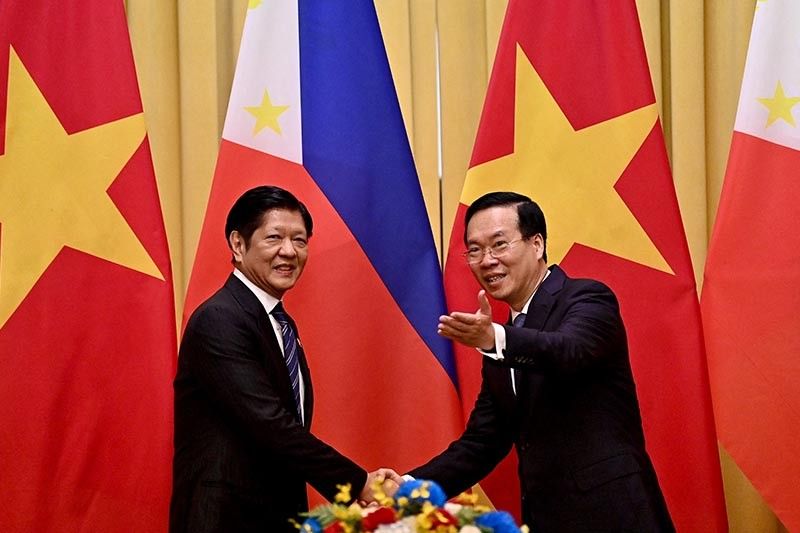Transforming 21st PH-Vietnam bilateral relations from security to strategic partnership

States form alliances when confronted with more powerful and aggressive powers. As a form of cooperative relations, an alliance is a political calculation that recognizes, despite differing and conflicting interests, its members’ need for each other’s assistance to achieve or defend the security agenda they all share.
Alliances are protean entities as they take several shapes and forms. Whatever form they take, however, alliances perform an essential role in stabilizing an anarchic international system that enables its members to aggregate their resources and commitment to confront a more powerful state.
Security or strategic partnerships are informal alliances or ententes through which countries engage in periodic meetings, joint exercises, and other limited security activities without creating a formal military alliance. A security partnership is a functional security cooperation based on something different than an alliance that does not aspire to develop into a formal one.
This functionalist form of security cooperation is conducted through the exchange of visits by senior officials and issuing of joint statements, enhanced staff-level exchanges, port visits by naval vessels, participation in humanitarian missions, provision of training and technology related to facilities and equipment, and other types of training. However, this trend of functionalist security cooperation can only develop into a partial-fledged movement toward alliance politics.
The primary goal of a security partnership is to address security challenges. Still, this type of inter-state cooperation also intends to balance relations with the great powers when appropriate and to what extent. States form security partnerships because they value their autonomy. They are unwilling to accept the cost of strengthening their relations with one great power over another.
The Philippines and Vietnam have formed a security partnership since 2015. The two ASEAN states reacted to growing Chinese aggression and expansion in the South China Sea. Among the ASEAN member states, the Philippines considers Vietnam its only security partner in this regional organization. Both Southeast Asian countries have consolidated their political and diplomatic ties through all-level contacts and exchanges and bilateral cooperation mechanisms.
Both countries have also conducted cooperative activities in culture, tourism, education, and people-to-people exchanges after the COVID-19 pandemic. The two countries' trade relations have also increased in the past years as Vietnam has become the Philippines’ most significant source of imported rice. During President Ferdinand Marcos Jr.’s recent visit to Vietnam, both countries decided to transform their bilateral relations from security to strategic partnership.
From security to strategic partnership
During his two-day state visit to Vietnam, President Ferdinand Marcos Jr. declared that his trip to Vietnam intended to lay the groundwork further to strengthen their security ties to a strategic partnership. This could happen if the two ASEAN states increase the exchange of delegations at all levels and establish bilateral cooperation mechanisms to strengthen their economic, trade, and investment ties.
President Marcos and Vietnamese President Vo Van Thuong agreed to increase the two countries’ cooperation in economy and trade by aiming to improve their overall trade by US$10 billion by 2025. This could be done by easing trade barriers, facilitating exports, optimizing regional trade agreements, and encouraging Filipino and Vietnamese businesses to invest in processing, high-technology agriculture, and oil and gas exploration.
The two leaders also agreed to expand the two countries’ economic cooperation to new and innovative fields such as digital and green economy, digital transformation, circular economy, and renewable energy.
Both countries agreed to expand their partnership by promoting defense and maritime security cooperation. The two leaders agreed to resume the holding of the joint committee on sea and ocean cooperation at the deputy ministerial level and to improve joint patrols and search and rescue at sea. They also decided to strengthen cooperation in law-enforcement campaigns against drug trafficking and cyber, economic, and high-tech crimes.
President Marcos and President Vo also witnessed the signing of three security-related agreements. The first is the Memorandum (MOU) on Incident Prevention and Management in the South China Sea. The MOU provides for the two countries’ bilateral cooperation in enhancing coordination regarding maritime issues with the ASEAN and other dialogue partners. It also encourages the Philippines and Vietnam to intensify their joint efforts to promote trust, confidence, and understanding through dialogue and cooperative activities.
The Philippines and Vietnam signed this MOU to pre-empt the danger of escalation of territorial and maritime disputes in the South China Sea. The two countries consider this agreement a reasonable and calculated solid step to address common challenges and threats in the disputed waters. Both countries also hope this MOU will set the appropriate diplomatic precedence for other claimant states in managing their disputes in the South China Sea.
President Marcos and his Vietnamese counterpart also witnessed the signing of the Philippine Coast Guard (PCG) and the Vietnamese Coast Guard (VSG) signed an MOU to establish a hotline between the two coast guards to boost communication and coordination. This is directed at strengthening the understanding, mutual trust, and confidence between the two parties through developing a Joint Coast Guard Committee to discuss common issues and interests between the Filipino and Vietnamese coastguards.
Philippine PCG Commandant Admiral Ronnie Gil Gavan said the “MOU would enhance the strategic partnership and cooperation between the PCG and VCG towards promoting, preserving, and protecting the two countries’ mutual interest in Southeast Asia.”
Finally, the two countries signed an MOU on rice trade cooperation. Under this MOU, Vietnam agreed to a five-year trade commitment to supply white rice to the Philippine private sector through its private sector, amounting to 1.5 million to 2 million metric tons per year at a competitive and affordable price.
A strategic partnership amidst great powers competition
The transformation of Philippine-Vietnam relations from a security to a strategic partnership is happening in the context of the two Southeast Asian countries’ improving security relations with the U.S. In 2023, the Philippines increased the number of Enhanced Defense Cooperation Agreement (EDCA) sites from five to nine.
The Philippine military held several large-scale military exercises with the armed services of its only formal treaty ally, the United States. Conversely, Vietnam hosted President Joe Biden in Hanoi. It also signed a full Comprehensive Strategic Partnership Agreement with the U.S.
This means that Vietnam treats its bilateral relations with the U.S. on the same level as its bilateral ties with China, Russia, India, and South Korea. And for the first time, Washington and Hanoi discussed the prospect of American arms transfer to Vietnam.
This development has consequently alarmed China. Chinese media warned of further risk of conflict should Philippine and Vietnam cooperation target a third party and harm other claimant states’ interests. The Communist Party-sponsored Global Times warned that Vietnam and the Philippines' cooperation in certain areas” would only irritate the situation in the South China Sea and increase the risk of conflict.”
Despite Chinese warnings and threats, the Philippines and Vietnam are firm in laying down the foundations to strengthen their newly established strategic partnership in the Indo-Pacific region further.
Renato Cruz De Castro is trustee and program convenor of think tank Stratbase Institute.
- Latest



























